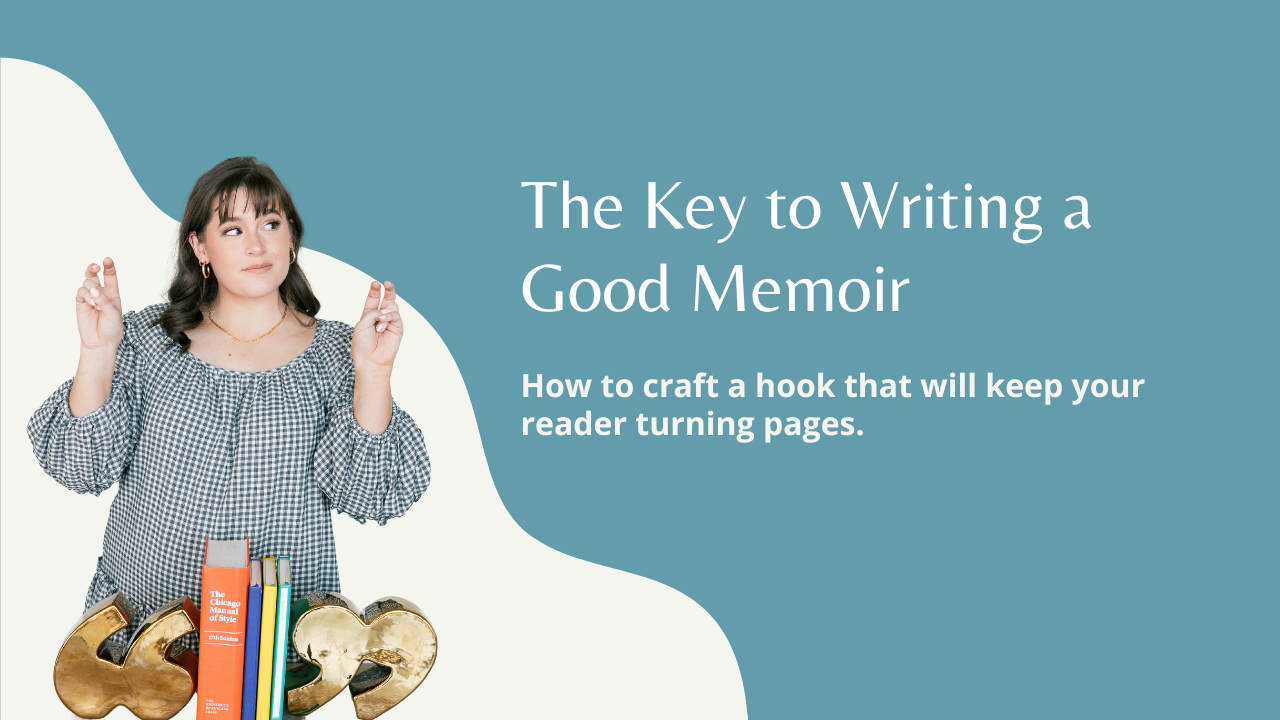The Key to Writing a Good Memoir
Have you ever read a book that felt like it was going nowhere? You couldn’t care less about the characters, what happened to them, or why they do what they do? I have plenty of books that haven’t hooked me (and if we were sitting down to lunch together, I’d probably tell you what those books were!). I’m sure you can think of a book (or three or ten) that just hasn’t worked for you. Why was that?
I DNF (translation: do not finish) books when I don’t feel a connection to the characters or when I can’t care about their fate. Memoir is no different. When I’m not hooked, I don’t keep reading.
The key to writing a good memoir is to (1) know who you’re writing for and (2) know why you’re writing it. I call this having a thesis, or hook. In writing memoir, your hook is the anchor to your entire writing process. When you know your thesis, you’ll know what you’re writing, who you’re writing for, and why your reader should care.
Ask yourself these 3 questions when crafting your hook:
Who is writing this? (Or better yet, is your story authentic?)
Your memoir should be definitively by you. When your reader picks up your book, they should know exactly who wrote it. Ask yourself if you’re allowing your voice to shine through. Is your message bogged down by others’ opinions or experiences? Are you writing from a place of authenticity, or are you putting up a mask or barrier in your writer? Anyone who picks up your memoir should know that you wrote it.
What are you writing?
What is your focus? What story (of all the stories you carry) are you writing? When you go into writing your memoir with focus, you accept that you might not get to share every little detail, that you are crafting an experience for your reader centered on a single story or theme. You should be able to tell someone in an elevator exactly what you’re writing before they get off at their floor. When you know your focus, you keep your writing tight and purposeful.
Why are you writing? (Or to put it more bluntly, so what?)
You may have several stories you tell at parties that are funny and extract a laugh from your audience. You might write out little anecdotes in social media posts. But here’s the thing: Not all of your stories are ones that your reader will truly care about. When you’re crafting your hook, you have to ask yourself, “So what?” Why is my story relevant? Why should my reader care? When you can articulate why you are writing and why your reader should care, you can move forward with greater clarity and purpose.
A note on your story and your reader
Two things: Your story is not going to be for everyone. When you identify who you are writing for, you are also identifying who you are not writing for. It is normal and okay and good that your memoir won’t be for every reader. That doesn’t reflect on you as a writer or on the value of your story.
Your story has inherent worth, even if you can’t yet articulate its relevance to your reader.
You may get to that third question and not be able to identify why your reader should care. This can be an unsettling place to be. You need to remember that just because you might not be able to answer So what? doesn’t mean that your story doesn’t matter. You also might want to talk to someone about So what? and gain insights from others. Not every story is going to fit well into a creative nonfiction piece, but I do think that most of them can.
If you are having a hard time answering So what? you can do a few things: (1) Take a break and come back later. Time does wonders to our minds. (2) Talk it over with someone. They might be able to see the relevance easier than you can, or could help you see your story in a new way. (3) Expand your focus. Your story might have more creative relevance in context of a different story. See what other stories you have that can connect to your original idea. You’ll make connections, that light bulb will turn on, and you’ll have it.


